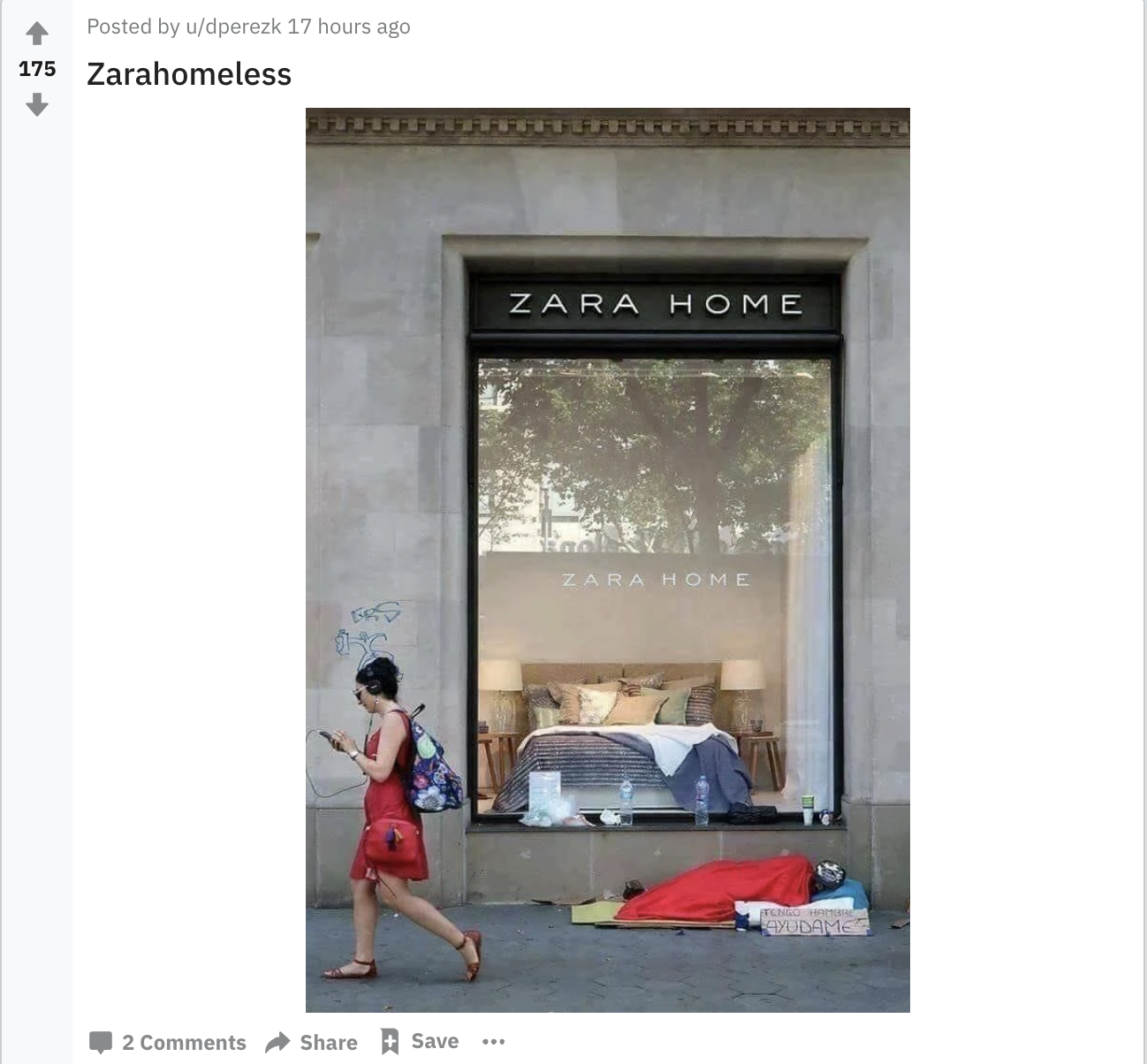How millennial life became the perfect breeding ground for late-stage capitalism
Photo: Eloi Teixidó Fontova
1. A brief history of late-stage capitalism
You might have heard the term thrown around lately, and while it’s easy to understand that it’s got something to do with the (many) negative aspects of capitalism, you might not know exactly what it means. Well, back in 1991 (ironically the same year I was born) this academic scholar called Fredric Jameson wrote a book called Postmodernism, or the Cultural Logic of Late Capitalism. In many ways, he’s the person who introduced the term into more mainstream settings. In recent years, the concept has grown increasingly dear to publications like The New Yorker and The Atlantic, or at least to parts of the “woke” left. In the book, Jameson explores how a globalized, post-industrial economy will inevitably give rise to a society where everything, everywhere, is commodified and consumable. Sounds kinda dystopian, right?
My favorite example illustrating what late-stage capitalism is all about is the larger-than-life phenomenon Queen B herself. Who will ever forget Beyoncé’s 2014 performance at the MTV Video Music Awards in front of a gigantic “Feminist” sign? A fierce feminist fighter, or just late-stage capitalism at its very core? All the large fast-fashion brands — from Zara to H&M — were quicker than quick to jump on the “feminist” bandwagon. In true profits-at-all-costs fashion, they started producing t-shirts with feminist slogans like “Girl Power” made by exploited and underpaid women workers in countries like Bangladesh. Not very empowering. But a cultural phenomenon that could be commodified to generate profits. That’s late-stage capitalism for Y’all.
Beyoncé performing at the 2014 MTV Video Music Awards
There’s even a Reddit community with 382k subscribers described as “A One-Stop-Shop for Evidence of our Social, Moral and Ideological Rot.” They share things like this:
So, how did we get here? According to Marx’s theory, capitalism is an economic system that’s naturally crisis-prone. In today’s globalized and interconnected society, everyone competes with everyone, everywhere. From the factory worker in Bangladesh; to the IT support folks in India; to the former automobile industry workers in the American Rust Belt; we’re all in constant competition.
It’s the impossible balance between paying workers as little as possible while still making sure they can buy the products that are making their employers rich in the first place that will eventually create the perfect storm. It’s not hard to see how that’s an equation that just doesn’t add up — and that’s why the one thing that’s true about this economic system is that it will enter in crisis. Repeatedly, severely, and on a regular basis. The financial crisis of 2008 was the worst recession in over 80 years. And we know there will be more, just not exactly when.
The gig economy is another perfect example of late-stage capitalism in action. Individuals are sold the idea of independence and flexibility, and in turn, they’re asked to respect precarious work and zero benefits. A zero-sum game? Yeah. The gig economy sure has enabled companies like Uber and Amazon to make impressive profits while also being the perfect paradox illustrating the nature of late-stage capitalism. Back to Marx, who theorized that because capitalists owned the means of production, it gave them the power over the proletariat (Marxist talk for the working class). But here we are in 2019, and suddenly we’re living in a world where workers are providing their own cars, bikes, and laptops to create and deliver the services provided by companies like Uber. You’ve got an app, so there’s no need for massive factories and infrastructure. Industrialization is so 18th century. We’ve got digital nomads now. And choice. Apparently.
Political theory wise, this late stage of capitalism should be followed by a revolution. However, it seems like the millennial generation is more preoccupied with Supreme announcing the launch of their latest limited edition sneakers in their Instagram stories than conjuring up a revolution. Which takes me to the next point.
2. How social media created a generation at late-capitalism’s service
A lot of critical thinking and questioning of the status quo (aka our neo-liberal economic system) has historically been confined to counter-culture groups like hippies, punks, and feminists. Some of them straight out rejected it. Others looked for ways to make it better, more humane. So how does political engagement look in today’s society where vertical video and constant flows of information reign?
Perhaps we add a frame to our Facebook profile picture and take it for political engagement, when actually, it’s just about the laziest form of activism we could take part in. A 2018 study by Pew Research Center looked at how Americans use social media for political engagement. While most found the nature of social media helpful, it also showed that roughly three-quarters of U.S. adults (77%) agreed with the statement that “social media distract people from issues that are truly important”. And 71% believe that social media makes people think they are making a difference when they really aren’t” So how is social media influencing us and the post-modern society we’re inhabiting?
Is it possible that social media is the perfect vehicle to distract us from the evils of late-stage capitalism, at the same time as it’s earning corporations such as Facebook and Google even more money? Think about it. The internet was invented. Then this guy (you might have heard about him) called Mark Zuckerberg came up with Facebook. Then Google became the default search engine (who even remembers AltaVista?). Then Amazon transformed how all of us buy anything from breakfast cereal to dishwashers. As a result, the data generated by our internet use started to become increasingly concentrated into a few hands (and pockets). Sure, nobody knew what social and political consequences the internet would bring. Look at Zuckerberg himself: his inches deep in his own shit with fake news and the Russian meddling with the 2016 U.S. election. So sure, nobody could have foreseen this. I won’t go all conspiracy-theory on you, I think these big companies just saw the opportunity and took it.
So there’s Snapchat, Instagram, and probably a bunch of other stuff I’m too 90s to understand. Becoming an influencer now seems like a perfectly normal dream job. Maybe kids briefly consider becoming a veterinarian but seriously who wants to stick their arm up a cow’s ass anyway?
Think of the typical teenager, your neighbor’s 15-year old daughter. Your nephew, maybe even your own kid. Think about their relationship to social media. What kind of values does it promote? And what does it tell them about consumption when Sara from volleyball just shared an Instagram story showing off her new Levis with an amazing push-up effect and now their butt can’t live without them either? Social media sells us the illusion of a better life and packages it as our own choice that’s always just a click or a purchase away.
3. How user-generated data empowered digital moguls to outgrow states
Amazon‘s Alexa is creating the perfect illusion of making your life easier and more convenient when in reality, it’s just making it easier for Amazon to capture your data and get you to buy more stuff. Maybe you’re more likely to compulsively buy an Iphone X or an expensive juicer when you’re on your period because you feel sorry for yourself. Now your user data and behavior can tell Jeff Bezos all about your period spending patterns. Okay, he’s probably not interested in your period per se but the AI his company has developed to show you the most relevant recommendations and increase your spending definitely is.
According to the latest Oxfam report looking at the distribution of global wealth and inequality, the world’s 26 richest people now own as much as the poorest 50 percent. The annual revenue of companies like Google, Microsoft, and Walmart is larger than the GDP of many small nations.
That’s what late-stage capitalism does to you: it sells you the illusion of a life full of options. Play the latest Chance the Rapper song on Spotify to make you feel cool. Order garbage bags so that you actually get five minutes to meditate. Subscribe to a weekly delivery service of pre-packed lunches so that you can spend more time perfecting that proposal. It seems like you have all these options, but in reality, you’re a prisoner to your own PayPal account with your hands tied with a fat rope made of your own self-generated data.
4. Why late-stage capitalism is a major bummer and will eventually destroy human existence and the planet
Sounds a bit bleak? Well, that’s the conclusion of this whole thing. You might have heard about that climate change study that created a big buzz in October last year. World-leading scientists clearly outlined just how serious the consequences of climate change will be, and that we’ve only got about 12 years before we face a full-blown shitshow of a catastrophe. Unless we make some serious changes to our consumption patterns and lives, that is. I’m not going to bore you with details about how your daily commute, your meat-rich diet, and frequent flying is adding up to all of this because if you made it to the end of this article you’re probably woke enough to understand all of that.
But maybe it’s actually time to do something about it, don’t you think?


